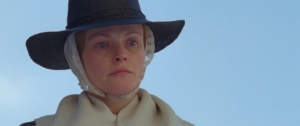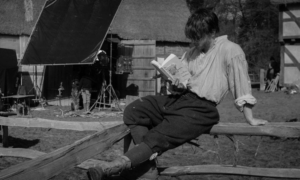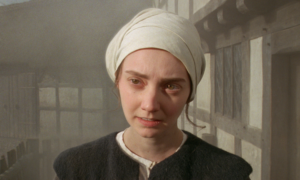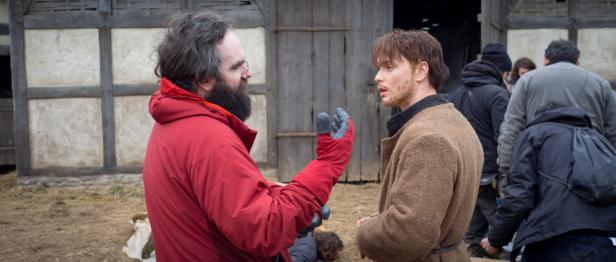Historical folk drama Fanny Lye Deliver’d follows the character of Fanny Lye (Maxine Peake – Peterloo, Funny Cow), who lives a quiet Puritan life with her husband John (Charles Dance – Game Of Thrones, The Imitation Game), and young son Arthur. But her simple world is shaken to its core by the surprise arrival of a mysterious young couple, Thomas and Rebecca. Then when an unexpected visit from the local Sheriff causes events to further escalate, Fanny’s life is changed forever.
Where did the inspiration come from for Fanny Lye Deliver’d?
When I was growing up I read Christopher Hill’s book, The World Turned Upside Down. It’s a book that transforms your view of British history, it’s an amazing book and completely different to anything that gets taught in schools. And then as I was reading about that book I wanted to make a film about that time period (the 17th Century) – about those characters, the protestants and the period, but I couldn’t think of the way to do it. And so it was something I lived with for years. Again, another kind of desire was to make a western – I’m a big fan of westerns so I guess the eureka moment was realising that maybe these two things can go together and I can make something that is a little bit like a western but set in the 17th Century. And once I had that idea it started to build from there and coalesce quite quickly.
What is it about this time period that fascinated you?
It’s a moment when the voices of the common people came through. You have the invention of the portable printing press and the collapse in government control. Suddenly you have this explosion of pamphlets essentially voicing philosophical ideas, religious ideas, political ideas, or even just people publishing cookbooks! But in a way, it was a technological transformation – kind of like a 17th Century version of the internet.
So suddenly you hear the voices of all the common people. So much of history is kings and queens and key events, but suddenly for this brief period before the Commonwealth started to reestablish control in the early 1650s, we suddenly hear these other voices. And some of those ideas have carried on and transformed the world, transformed the way we see the world. So even though the ultimate result of the Civil War wasn’t as transformative as maybe people at the time had hoped, philosophically, politically, the ideas have carried forward. So I think it’s an important and really fascinating period in history.
You had the feudal king, which was just a dictatorship really. Then you have the puritans who were briefly in control. I guess [the character of] John represents the puritans. The sheriff, well he pretends to be a sheriff but he’s really a cavalier so he’s a feudal, old school man. Then you have these even more radical groups, so the Ranters, which we see with Thomas and Rebecca, who essentially want to reject everything, even though they use the language of the bible – everything had to be told through that and filtered through that book. They’re kind of proto-anarchists almost, and then finally the Quakers kind of came out of the Ranter movement.
Towards the end of the film, Fanny begins to move towards a Quaker idea. The Quakers were particularly well known at the time for promoting women’s rights and being very brave. Lots of them were imprisoned and punished for their beliefs.
How much research did you do before writing the film?
A fair bit. It began with reading a combination of books and pamphlets and then bringing in historical advisors. Interestingly, I discovered that there’s a fairly large reenactment community in the UK – people who like to get together and dress up and pretend they’re fighting in the Civil War. Within that community, there’s a huge pool of knowledge. On certain subjects, social history, details of what people would have worn, clothes, the materials, those sorts of things. Often the reenactors were more logical than the true historians!
How long did it take you to write the film?
It took about a year I guess, but that’s because of the involvement of the advisors and the experts. Then doing a draft and adjusting it based on comments and the language. We brought in someone who specialises in language who would go through it and pick out: “Oh you can’t use this word,” or “look at this sentence again”. So I guess it took a little longer than it usually would to write a script! But it was fun all the way.

In the title, you use the word ‘deliver’d’ for Fanny – why did you use that word and what does it mean to you?
It’s hard to put one interpretation on it. It can be read in so many different ways. The self – is she delivered by Thomas? Or by the events? It’s slightly ironic in a way as well…
What made you decide on having a woman at the center of the movie? Is she based on a certain historical figure?
There’s no one particular figure, but looking at that particular period, women’s voices came across very strongly. Margaret Fowl was the co-founder of the Quakers, and you had Mary Dyer, another Quaker who, like Fanny in the story, travelled to the New World and began to preach the Quaker version of the gospel. Eventually, she actually was hanged in Boston in 1660 – people were giving up their lives for their beliefs and to bring that to the film was important for me.
What challenges did you come against when directing a period film?
There are more details you have to get right before you start filming! So there’s a lot of preparation. But we were lucky because most of the film is in a single location so we were able to really focus and get everything ready and have that kind of control. It would be a lot harder if there were more locations, you’d definitely need more money in it.
Where was the movie filmed?
We found a farm to the south of Bridgend in Shropshire, which is where we built the farm. We chose it based on the lay of the landscape. I had this idea in my head of how the farm would be laid out with the trees behind up to the north and the hill off to the east so the sun for certain scenes would twist through our location.
It was all built there on location. We did a 360 degree indoor/outdoor set so we could shoot everything there without going to the studio or using effects.

When writing the movie, did you have a cast in mind?
Not specifically when I was writing it, but very early on I started to think it would be great to have Maxine (Peake) play Fanny. We had a casting director who made the approach. Maxine came on about a year before we shot the film. Maxine had a similar fascination with this kind of time period and our idea of how the film should be made, could be made, so we were very much on the same track!
Fanny Lye Deliver’d is a very character-driven story. How much work on developing character did you do with the actors?
[Character development was] mostly in the script but the way the rest of the cast came together was that the date for the production shifted around a bit so we weren’t able to cast a lot of the roles until very late on. So we had actors calling us confirming the week of the actual shoot! So we couldn’t do a big rehearsal beforehand. Instead we’d rehearse in the mornings. So we’d spend half an hour, an hour going through the scene before the camera people arrived and that was important for the actors.
The film’s story is described via a voiceover from Rebecca’s character – what made you decide to go down this route and why from this particular character?
It was something that came together in post-production which does happen sometimes. Initially, it was an experiment. I wanted to get the film shorter and tighter and thought maybe we could try this voiceover. In the process of writing it and recording it with Tanya (Reynolds) I fell in love with it. Now it would be very hard for me to let go of the voiceover. We never tried it with Maxine, I guess from the beginning it felt like it would be too straightforward if it came from Maxine.
I think you want a little bit of mystery, to not be sure which way Fanny is going in certain scenes. If we had her internal monologue it would give away too much!

What genre would you say the film fits in to?
The western is the biggest influence. But there are other elements to it. I guess when I was writing I wasn’t trying to stay in one box. There are different elements coming together, different influences. In the age of streaming maybe that’s not the most straightforward thing to do but I guess it is what it is!
You also composed the soundtrack for the film, what were your inspirations for the music?
Visually, we went for this almost Seventies kind of feel for the film so when I started to cut it I began to feel that the music should really be in the same sort of mould, but it’s not the kind of score that gets written a lot these days. Film scores these days tend to be more in the background or using different instrumentation. To have a more light motif in the score is not so common. I guess because of that it became difficult to find the right composer and during that time, the ideas started to pop in my head – the themes and the music – so by the time we did find potentially someone who could do it, I had too fixed an idea in my head and we came to the conclusion I should just do it myself!
I studied music in university but it’s been on the back burner for a while as films took over. And I hadn’t gone back to it for a long time. I guess that was part of the draw of it, as well, to go back and to try and compose again. It was nice to do that.
What were you aiming to convey through your score?
I was giving themes for different ideas. There’s a freedom theme for when Thomas starts looking for freedom or when Fanny starts to demand a different life for herself. There’s an almost military puritan theme associated with John. Oh and the sheriff has a theme as well! That was the main focus – different themes for different characters, different moods.
At what part of the filmmaking process did you write the score of the film?
In post. But I was always thinking when we were shooting the film. There were moments where I was like ‘this is going to be a music moment in the film’. But I didn’t know exactly what it would be, or who would be writing it.
What element of the movie-making process – the writing, directing and composing – did you enjoy most?
Recording the music was very special because I hadn’t had the chance to do that before. It was almost like a project in itself. Just going through that was amazing.
What’s next for you?
I’m not sure what I’m doing next. This is a kind of never-ending project. Even with the filming finished, we’re dealing with the release here, we’ve got the release in the US next month, and the soundtrack to get out. Those things have been occupying my time these last months.
Do you think it will be another period piece?
I do have some scripts in that vein but I’m not sure now. It’s just nice to do something different each time. It may be a musical or even a sci-fi movie!
Fanny Lye Deliver’d is released on digital 26th June. The official soundtrack album is out now on CD and digital formats.
